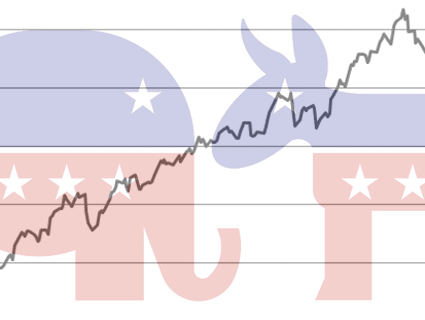
Photocollage based on image from <a href="http://www.flickr.com/photos/donkeyhotey/6262122778/">Donkeyhotey</a>/Flickr
Among the 15 top donors to outside political groups this election cycle, only two happen to work for the same company: James Simons, the billionaire founder and chairman of the hedge fund Renaissance Technologies is a prominent Democrat. RenTech’s co-chief executive, Robert Mercer, is a Republican backer of right-wing tea party candidates. In all, they’ve given $3 million to political groups and candidates that often seem to be diametrically opposed.
In an election year in which the Democratic Party’s Wall Street donors have threatened to jump ship, RenTech’s approach may provide a roadmap for the financial sector’s evolving political strategy. By all appearances, the notoriously secretive hedge fund approaches politics as it approaches investing: by hedging its bets.
While it’s hardly unusual for people in the same office to support opposing candidates, it’s much less common among megadonors. For instance, Mercer gave $30,800 to the National Republican Senatorial Committee last summer, four months before Simons gave $500,000 to Majority PAC, which aims to keep the Senate under the control of Democrats.
Between 2000 and 2008, federal campaign spending by hedge funds and their employees ballooned from $2.4 million to more than $19 million—a figure that will likely be surpassed this year, now that the Supreme Court has opened the door to unlimited spending by outside groups. Unlike other politically active industries such as real estate and health care, which rely on corporate PACs and trade associations, the vast majority of hedge fund contributions come from executives and their spouses.
Simons and Mercer may legitimately disagree on some political issues, but no matter which party is in charge, they can count on finding supporters for one of their shared policy priorities: keeping the tax man away from their profits. Since 2011, their company has spent $920,000 lobbying on tax issues affecting money managers. Recently, for instance, it gave $130,000 to the lobbying firm DLA Piper to oppose the Carried Interest Fairness Act of 2012, which would close the loophole that allowed Mitt Romney to pay a mere 13.9 percent of his 2010 income in taxes.
“It’s all about influence,” says Cathy O’Neil, a former quantitative analyst at the hedge fund DE Shaw who is active in Occupy Wall Street’s Alternative Banking Group. “I actually don’t think these guys are Democrats or Republicans. I think they are all libertarians. They would never want to be taxed because their whole thing is that they are smarter than God, so they are the ones who should be making the decisions about where their capital is allocated.”
A few years ago, a contractor asked Mercer to allocate more than $2 million to pay for a “museum quality” HO-scale model train diorama he had built to occupy a portion of his Long Island mansion measuring about half the size of a basketball court. So says Richard Taylor, who installed the train setup before Mercer sued him, according to the New York Daily News, claiming Taylor had overcharged for the job. Simons’ other hobbies include cruising in his 222-foot yacht, Archimedes—which in 2010 was among the world’s largest.
Back in 1977, Simons, a former math professor and Vietnam-era code breaker for the US National Security Agency, founded the investment business that eventually would become RenTech. At the time of the 2007 market crash, RenTech was America’s largest hedge fund, and even today is worth around $15 billion. Its staff of scientists and mathematicians use a fleet of supercomputers to crunch its top-secret investment algorithms. RenTech’s Medallion fund, which consists almost entirely of employees’ money, has done so well compared with RenTech’s other funds, writes Dealbreaker‘s Bass Levin, that some people grouse that it must be a Ponzi scheme. “These people are, of course, imbeciles,” he adds. (The company has nonetheless scrimped in other areas. In 2009, New York state labor officials ruled that RenTech had improperly classified its security guards as independent contractors, thereby saving thousands of dollars in unemployment insurance and other costs.)
RenTech spokesman Jonathan Gasthalter declined to respond to my questions about the firm and its political strategy. A former RenTech exec recently told the Financial Time that Simons’ and Mercer’s political views are “irrelevant” when it comes to managing the fund.
Be that as it may, their overall political spending certainly overlaps with the firm’s interests. In 2010, Mercer donated $200,000 to fund attack ads against Rep. Peter DeFazio (D-Oregon), who coauthored a bill that would tax securities and derivatives transactions. (DeFazio was reelected anyway.) Since last August, he has given $350,000 to the political action committee of the virulently anti-tax Club for Growth. Last October, Mercer gave $2,500 to Florida congressman Allen West, who has called for lower corporate taxes, and who recently claimed that at least 80 House Democrats were “communists.”
Although Mercer recently donated $1 million to Restore Our Future, the super-PAC that supports Mitt Romney, RenTech’s political investments should pay dividends no matter who wins the White House. Simons’ donations skew toward Democratic pols overseeing the financial sector. In 2008, he gave $4,600 to Rep. Charles Rangel (D-New York), who sits on the powerful Joint Committee on Taxation. In 2009, he donated $4,800 to Chuck Schumer (D-New York), a member of Senate taxation and banking panels. And this year, he gave $5,000 to Rep. Steve Israel (D-New York), who has served on the House Committee on Financial Services. (As it happens, Peter Brown, Mercer’s co-CEO, is married to Margaret Hamburg, who heads Obama’s Food and Drug Administration.)
The company is spreading the love at the state and local levels, too. From 2005 through 2010, RenTech managers and executives and their immediate family members gave $4.2 million to candidates, committees, and PACs across New York state—twice as much as any other hedge fund, according to a recent investigation by Common Cause New York. More than $1.5 million of that came from RenTech’s VP of research, Henry Laufer and his wife, Marsha, who gave to Democratic causes. None of this prevented the New York Legislature from passing a “millionaire’s tax” on its highest earners. Even so, “if a company gives a huge amount of money to both parties,” says O’Neil, the former Wall Street analyst, “then they have influence in the end.”















